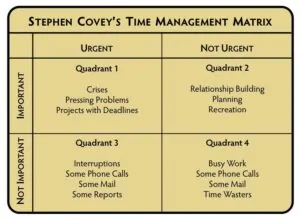Leaders, What Are You Sending Downstream?
by Robert Hackman
Photograph by Geetanjal Khanna on Unsplash
Nobody knows, nobody sees
I’m caught downstream, and I’m floundering
Lyrics from the song ‘Floundering’
By Stan Ridgway
A client recently lost a couple of significant clients – something that rarely happens to them. Outwardly the executive remained calm, yet I could tell he felt pressured and distressed. The company maintains aggressive growth goals.
I listened to what led to the customer defections and the company’s response to them, and I proposed two methodologies they could employ to help prevent them in the future.
During the conversation, I asked him what percentage of the executive team could articulate the company’s overarching strategy and cultural pillars. He said less than fifty percent.
This is a team that meets weekly to work on the business. Clearly, there are opportunities to improve the alignment and collective focus within the executive group and, just as crucially, with the associates outside of it.
It reinforced my belief that the most important decisions are always made upstream. At least, they should be because they impact everything downstream.
It is what makes strategic decisions so much more impactful than tactical ones. Tactics alter the periphery, while strategy and culture combine to determine the direction and vitality of the core.
A leader’s most crucial responsibilities include setting the direction, determining how things are to be done, and letting people know why their organization exists.
What are the consequences of leaving fundamentals undetermined? What prevents leaders from making these crucial decisions? What changes do they need to undertake to render them?
What are the effects of leaving fundamental decisions undecided?
‘We tend not to pay attention to what we have not put words to.’ Words are vital to initiating and shaping action.
When team and organizational leaders do not establish an overarching strategy, identify core values, or determine an aspirational purpose, those downstream in the organization must do without them. The customer-facing associates’ interactions cannot be guided by something that does not exist.
The foundational elements cannot be reinforced and integrated because they have never been defined. Managers can only effectively align their teams if there is a center to align around.
Therefore, associate-client interactions will not be infused with what leaders have deemed most critical to the company’s success. Employees will not be able to act and speak with conviction on behalf of customers. They cannot exercise discretion when making in-the-moment decisions that align with the company’s intent.
These interactions separate teams and companies from one another in meaningful ways. The lack of upstream decision-making creates what Coach and Forbes writer, Jill Bornstein, calls a culture of ambiguity, which invites uncertainty that leaves downstream associates anxious and adrift.
What prevents leaders from making essential decisions?
They are busy contributing directly to their company. They are good at and enjoy what they do. Their efforts have led to business success.
Leaders fear becoming overhead – a cost to the business. I recall how challenging it was for the partner of a technology consulting company to remove himself from being billable and devote himself full-time to leading the organization.
The concerns are more than financial. Leaders gain satisfaction from being the go-to decision-maker. Consequently, they lose a piece of their identity. Changing requires them to let go of a source of accomplishment, satisfaction, and status.
Leaders see the impact of their efforts more easily when working in the business than when they work on the business.
The status quo appears less risky than making a shift. Consciously or unconsciously, they ask themselves, ‘What if I am not good at these new undertakings? What if I fail?’ At some level, leaders need to be willing beginners again, which feels vulnerable.
They fear a dip in performance. Who will replace my contributions? What are the consequences if it does not work?
Delegating is an acquired skill that involves more than you think. It always takes focus, effort, and attention and is slower at first.
Many leaders start businesses because of the specific skills they developed and their capacity to meet the unfulfilled needs they identified in the market. They achieved success by knowing what to do.
Not knowing is intolerable. Asking for outside help feels uncomfortable. While they may not be cognizant or feel equipped to contend with the increasingly complex dynamics in their companies, they do not want to admit that to themselves or others.
A lot is going on within leaders that generates resistance.
These responses are valid and understandable. Nevertheless, they hold themselves, their teams, and their companies back if they do not address them.
What changes do leaders need to make?
You need to recognize that what got you here will not get you there. The needs of your organization change, and you must change with them.
You must relinquish some of what you do to free yourself up to handle crucial upstream work. The problem is that vital upstream work does not feel urgent.
However, if you do not let others know what is most significant, how can you expect them to know?
Enrolling others within your company in what matters most creates leverage. It extends your influence and the reach of your team and company. It keeps you from becoming a bottleneck that constrains the organization.
Ascertaining the few essentials of their companies represents vital work for leaders. Relentlessly focusing on them is another.
Conrad Ruiz runs a time management company called Well Aware, which professes to ‘make time for people’ and ‘give them back their time,’ which is, of course, impossible. Yet he is on to something.
Despite their successes, leaders often believe something is not quite right and could be a lot better. They feel their work and life run them rather than the other way around.
How, on what, and where you spend your time, energy, and focus determines whether you act in alignment with what you consider essential. Paying attention to what matters most is how you live and lead with fewer regrets.
How do you stay on track? Get help and employ methodologies.
One way is using the time management matrix from Stephen Covey. It is not new. It is not complex. It is effective.
The first step involves identifying what belongs in each quadrant for you, especially Quadrant Two.
Quadrant Two is meant for upstream work. Yet extricating yourself from the everyday is easier said than done. It can feel necessary to succumb to the tyranny of the urgent – even when it lacks potency.
Remember, everything done upstream determines what flows downstream.
Upstream work is meaningful because it generates the most significant impact. It requires focused attention to determine and stay with what matters most. The time and effort are always worthwhile.
Leaders do not get there on their own. No one does.
Worthy Inquiries:
- What are the consequences of avoiding critical upstream decisions? What keeps you from making them?
- What must you stop doing to make these foundational decisions? Whom will you involve in the process?
- What activities belong in quadrant two for you, your team, and your company?
- How much time, energy, and focus does your executive team spend in quadrant two? What would help get and keep you there more often?
- What could be different and better for you, your team, and your company? What changes would get you there? What do you need to make them?
Please reach out to me for help naming and claiming vital upstream decisions that benefit you, your team, or your organization. I welcome the conversation.
Robert Hackman, Principal, 4C Consulting – Courageously Curious Consulting and Coaching, helps people live and lead with fewer regrets. He grows and develops leaders through executive coaching, strategy consulting, facilitation, and training of individuals, teams, and organizations. He is committed to Diversity, Equity, and Inclusion. He facilitates trusting environments that promote uncommonly candid conversations. Rob is also passionate about the power of Everyday Legacies and developing Legacy Mindsets. He has conducted over 50 Legacy interviews with people to date.
A serious man with a dry sense of humor who loves absurdity. Rob can often be found hiking rocky elevations or making music playlists. His varied mixes, including Pandemic Playlists and Music About Men, can be found on Spotify.


